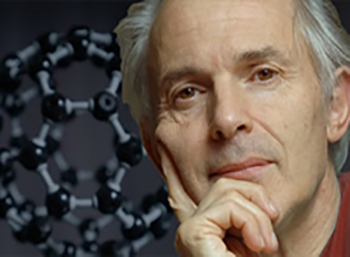
“What makes thunder?” “Why do frogs jump?” “What are we made of?”
Those are the sorts of questions that curious children often spring on unsuspecting schoolteachers — and that their teachers sometimes struggle to answer.
To make teachers’ jobs a little easier, Florida State University researchers have created GEOSET — short for "Global Educational Outreach for Science, Engineering and Technology." Employing a broad range of interactive media, GEOSET provides short educational segments on topics ranging from algebra to penicillin to the origins of the universe. From anywhere in the world, teachers can access them via the Internet to increase their understanding of various scientific or mathematical principles — or even share the segments directly with their students.
"Teachers can utilize a tremendous database of knowledge and then pick and choose what they wish to use in their lesson plans," said Harold Kroto, Florida State’s Francis Eppes Professor of Chemistry and a recipient of the Nobel Prize for Chemistry in 1996. "Meanwhile, there are a million people out there with a passion for some specific topic and the altruistic desire to make that expertise available to the world. GEOSET lets them do so."
Kroto — the mastermind behind GEOSET — now works with several Florida State colleagues to create science programs complete with video feeds, photos, graphics and PowerPoint presentations, all generated using webcasting technology developed by the company Sonic Foundry Inc. He envisions GEOSET as "something of a cross between YouTube and Wikipedia."
"What a marvelous tool this is for sharing and disseminating knowledge in an incredibly easy-to-use format," he said. "As the world becomes more of a global community, it is critical that children everywhere have access to the same high quality of information so that they can work together to solve some of the very serious problems facing us all. In that regard, GEOSET is at the forefront of an educational revolution."
To expand GEOSET’s reach even farther, Kroto’s team has established an international network of participating universities that can use their own experts to create a single shared database of downloadable teaching material. That database already includes contributions from researchers at the University of Sheffield in England and Toyo University in Japan. They soon will be joined by England’s Royal Society of Chemistry, Otago University in New Zealand, Perth University in Australia, and the Scripps Research Institute in Florida and California. Even more are likely to join GEOSET once they see the value in sharing information in this manner, Kroto said.
Back on the Florida State campus, Kroto has discovered another use for the GEOSET technology — having students prepare their own presentations, either to assist them in applying to graduate schools or as part of their coursework.
"For undergraduates planning to continue on to graduate school, a personalized video presentation is invaluable," he said. "A person reviewing their application could see quite clearly what the student is capable of and would be much more likely to admit the student into their program. This beats the traditional pile of paperwork hands down.
"We’re also making it mandatory for all Ph.D. chemistry students to produce a scientific presentation for GEOSET," Kroto said. "This revolutionary aid to teaching is the wave of the future, and it is critical that we prepare our up-and-coming scientists and educators so they can communicate using the latest technologies. In fact, I would like to see colleagues in other disciplines here at Florida State begin to use this technology to help their students improve their CVs (curricula vitae)."
GEOSET recently received a tangible sign of its success when Florida State earned a major international award for a presentation developed to illustrate the GEOSET concept by Steve Acquah, one of Kroto’s colleagues. In April, Acquah, a postdoctoral associate and researcher, received a Rich Media Impact Award for Global Reach from Sonic Foundry for a presentation he created. The award honors organizations that have demonstrated measurable improvements in accessibility, cost savings, efficiency and productivity through the company’s Mediasite technology.
In addition to Kroto and Acquah, other members of the GEOSET team at Florida State are Professor Penny Gilmer, adjunct instructor Colin Byfleet and graduate student Donald Bratton, all in the Department of Chemistry and Biochemistry; and Dave Simpson, a media specialist in the university’s Academic & Professional Program Services division.




